The best CRM software solutions go beyond nurturing customer relationships. They help foster a culture of teamplay among your business units like sales, support, and product development to help align your business strategy with customer expectations.
To meet these goals, some vendors develop robust solutions while others go for ease of use to ensure user adoption. In this guide, we compare two products that represent both scenarios.
Below, we compare monday vs Salesforce with regard to their core features. We also delve into their integrations, ease of use, pricing and use cases. After reading this article, you should have a better understanding of how the two CRM software solutions are different—and similar in some ways.

monday vs. Salesforce Table of Contents
CRM is becoming more than just a sales and marketing process. It is, in fact, now at the core of growing businesses wanting to tap into the power of a hyper-personalized relationship with customers. After all, acquiring new customers is five times more costly than retaining them.
Today’s solutions offer more than key CRM benefits and features. They help you spot inefficiencies in your business processes, consolidate customer-relevant efforts and, where everyone’s efforts are optimized, help lower productivity costs.
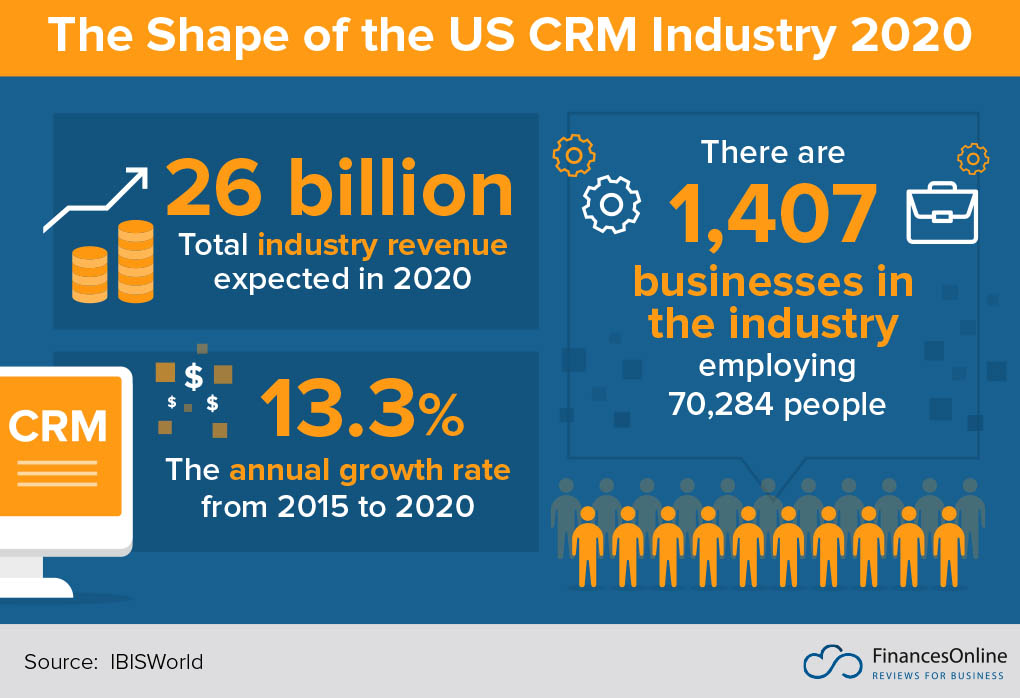
That said, getting CRM software means you have to stay updated with current CRM trends to ensure your tech stack is up to speed with new opportunities and challenges. For example, consider looking for AI-powered automation to manage ever-growing customer data or an integrated AR/VR feature for an immersive customer engagement.
Below, you’ll find two of the leading CRM software solutions in the market today. Hopefully, our monday.com vs salesforce guide will help you choose the better-fitting software to bring your CRM to the next level.
Overview of monday.com and Salesforce CRM
monday.com

monday.com dubs itself a work OS as it can be used for myriad key business areas: project management, task management, software development, HR processes and creative and design processes. It also has a CRM work board that can easily be set up, giving your team an instant functional lead board and a sales pipeline board.
At its core, monday.com is a project management software, but it can be configured to manage CRM processes such as lead management, contact management, lead capture, customer onboarding, and many more. With one of the most user-friendly UIs, the software is best suited to small and medium-sized businesses without an in-house IT team.
monday.com allows you to gain greater visibility across your sales pipeline, identify bottlenecks before they escalate, centralize client communication and automate sales processes. You can also integrate it with dozens of third-party apps to add more functions.
Furthermore, monday.com offers a free plan for up to two users. Pricing starts at $8 per user/month.
Salesforce CRM

Salesforce CRM, also known as Salesforce Cloud, is a cloud-hosted CRM that scales from small business to enterprise features. Considered a pioneer in SaaS CRM, Salesforce has evolved into an end-to-end CRM platform that can be expanded with a slew of other business systems.
It is packaged differently for specific use cases in sales, marketing, and service, all based on the core CRM infrastructure that aims to give you a 360-degree view of the customer. It is ideal for financial services, healthcare, consumer goods, the public sector, and just about any industry requiring CRM.
The software features powerful contact management, lead management, opportunity management and email integration at its base plan. You can bump up to advanced features such as workflow and approval automation, rules-based lead scoring, collaborative forecasting and dedicated support. A native mobile app is also available across all plans.
Furthermore, you can expand the core CRM by integrating it with other Salesforce products, notably Einstein (AI-powered analytics), Commerce Cloud (ecommerce platform) and Community Cloud.
Salesforce CRM is available in four pricing tiers tailored to a growing business.
Comparison of monday.com and Salesforce CRM
CRM Core Features
monday.com is a standard CRM that’s able to cover a wide range of use cases outside of CRM such as project management, HR and software development. It is lightweight compared to Salesforce Cloud and that’s not a fault if you need a simple but effective CRM. Just plug and play this software and even the least tech savvy member of your team won’t be intimidated.
On the other hand, Salesforce scales to enterprise CRM integrated with other business systems for marketing, customer service and ecommerce. Sure, small businesses can use Salesforce, but they’ll likely require a tech person to do some backend configuring to set it up.
When comparing monday crm vs salesforce, the former is a good choice if you only need standard CRM features. That said, user adoption aside, what monday.com can do, Salesforce can. However, the reverse isn’t always the case.
Contact Management
Both software allow you to keep contact records on customers, prospects, vendors and other stakeholders in one place. The records are easy to retrieve and relate to other records like deals, orders, campaign feedback, tickets, etc., thereby giving you a quick context of the person during calls or campaign targeting.
Where monday.com and Salesforce differ is in the depth of feature.
Leveraging the robust Salesforce ecosystem, Salesforce CRM can integrate with a native collaboration app (Chatter, sold separately) and pull data from your customers’ social content to uncover their issues or needs relating to your product or service. You can get customer feedback, share files, data and insights, propose ideas for campaigns, and conduct polls on one platform, helping you close deals, cases and unearth lead opportunities.
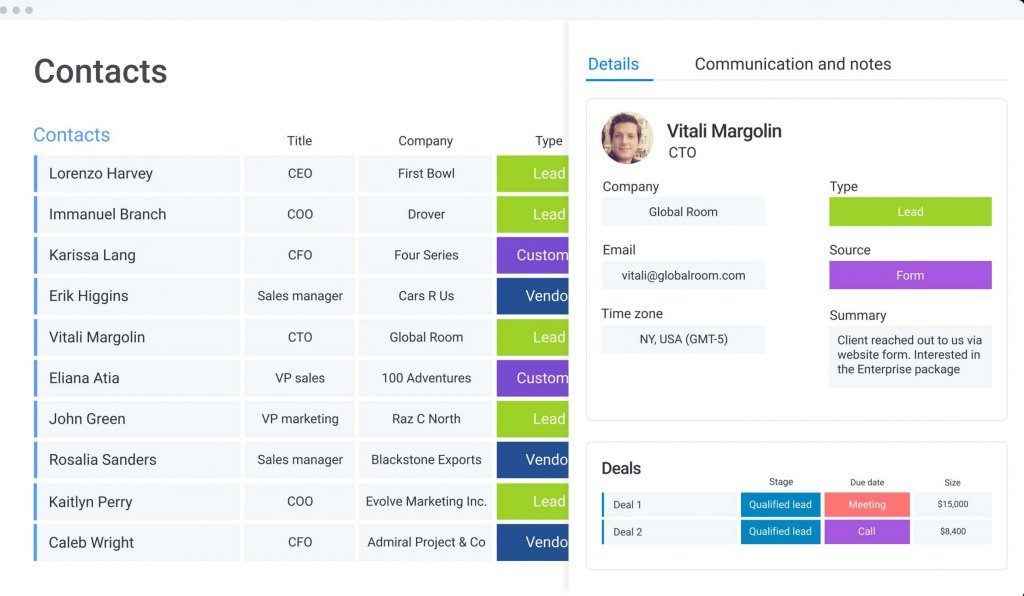
monday.com contact management.
Lead Management, Sales Pipeline, Deal Stages
Salesforce has a rich sales path feature that helps reps follow your sales process and stick to your best practices. You can set the required fields prior to moving leads to the next stage and link related posts, chats, notes, reminders, etc. to help reps contextualize a lead. The CRM also allows you to visualize the sales path, lending clarity to its stages and requirements.
But it is not to say monday.com falls short in lead management. It has a lead management template that lets you group your leads by category, for instance, new, qualified, and not qualified. You can even choose from over 20 column types to customize the lead board to include data such as email address, phone, country, and assigned person.
But clearly, monday.com’s feature is best suited to basic to midrange lead management needs, where Salesforce is a tad complex and costly.
Another thing, Salesforce doesn’t need much integration with third-party apps to deliver core CRM functions. On the other hand, monday.com requires integration with Clearbit to create forms based on the lead board’s data fields. You can embed the form on a web page or share it by link. Once filled in, the form will send the details to your lead board. You’ll love the function, but it’s dependent on another vendor.
But if that is a no-issue for you, consider the feature: monday.com automatically assigns leads and move leads to the next stage triggered by an action. You can send automatic text notification to the assigned person, but this requires integration with Twilio. And via another integration, this time with Gmail or Outlook, you can send an automated welcome email message to the lead.
Through integration as well, you can sync dates and alerts in your calendar (Google, Apple, or Outlook) with a date column in your monday.com lead board.
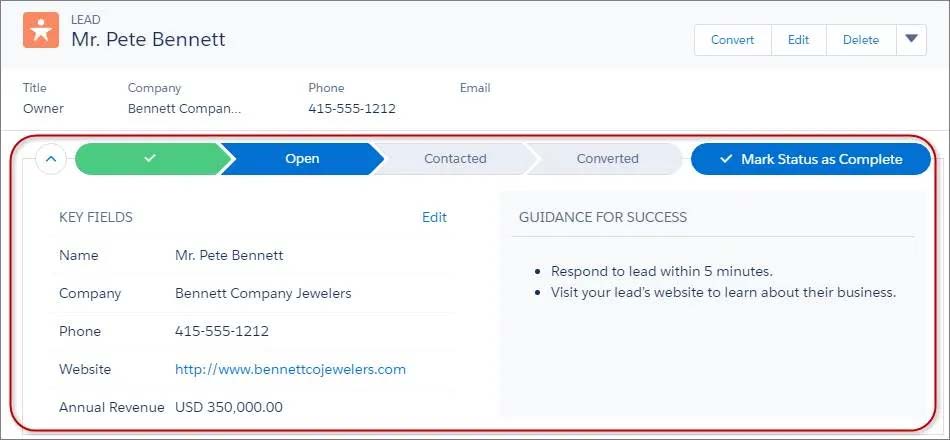
Salesforce CRM sales path
Lead Scoring
Lead scoring helps you optimize your sales team’s time so they focus on leads with the most potential to convert. In both CRM platforms, you can set up a sales pipeline with a lead score column. But, manually done, assigning lead scores this way requires scoring standards and consistent compliance. Otherwise, reps might be chasing false leads, a waste of their time.
To up your game, you can turn to predictive lead scoring. An AI assigns the score based on key metrics such as page views, landing page views, downloads, site search, email click-throughs, clicks, and video runs.
Both CRM don’t have this built-in feature, but Salesforce can turn to its AI tool Salesforce Einstein for predictive lead scoring. It learns customer behavioral patterns and calculate customer actions with greater accuracy than a human mind can.
You can probably have the same feature with monday.com through third-party integration.
Analytics, Advanced Reporting
monday.com has 15 widgets you can play around with to display your KPIs. However, these are mostly tuned in to the productivity side of your team.
A project management software at its core, monday.com excels in managing and monitoring tasks with big-picture visibility or drill-down accuracy. It lets you build stacked charts to track each rep’s sales performance against a third parameter (ex. product type). It also features a workload view that shows how the team’s tasks are divided.
Meanwhile, a weekly capacity widget lets you put a cap on the number of hours per task to optimize your reps’ productivity. You can also use a chart widget in monday.com to analyze basic lead metrics such as lead sources and their share by status (e.g., qualified, unqualified, in progress).
For CRM KPIs, however, monday.com has a few widgets such as a number widget to display the number of qualified leads, deals or the amount earned for a given period, the chart widget to correlate the numbers and a few other widgets to set the time period or consolidate location-based data. Again, for most small and medium sized businesses, these are the only KPIs they’ll need. Why complicate matters?
If indeed matters get complex, Salesforce CRM can handle things more readily. It can send real-time data to the dashboard like conversion rates and lead volume. A mobile customer analytics app lets you track your sales team’s metrics on the go, too. And, leveraging Einstein again, you can use historical customer data to forecast sales and get insights for your next strategic move.
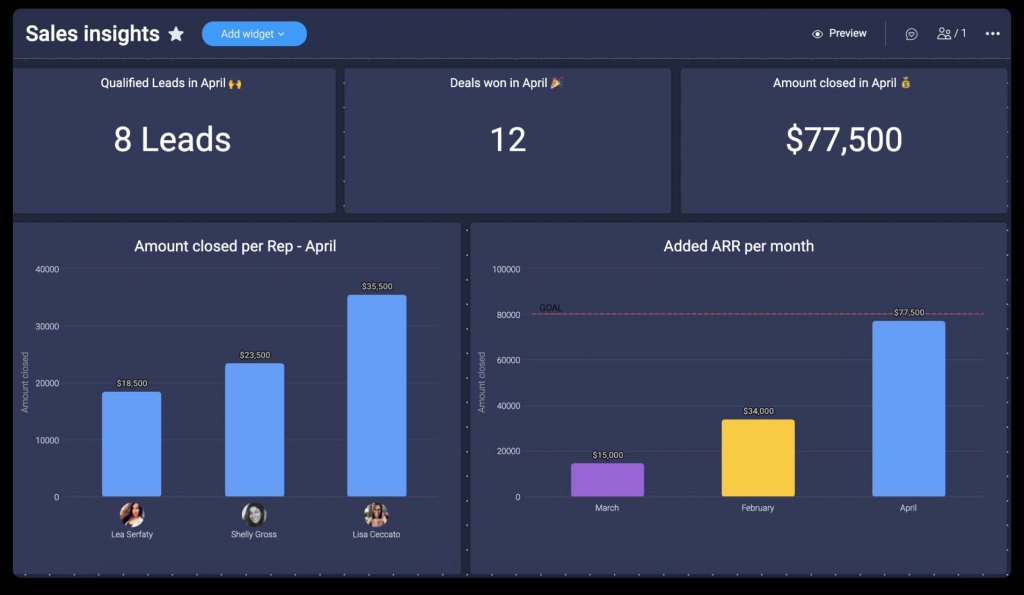
monday.com sales insights.
Quotes and Invoicing
Both CRM solutions have a built-in feature for quotes and invoices. In monday.com, you can create quotes and invoices inside your workflow board. The app is pre-built into the CRM template, but if you’ve built your own board, you can simply add the widget to your board.
On the other hand, Salesforce CRM’s quote and invoicing feature is available in its Professional, Enterprise and Unlimited editions. With user permission, you can control who can create, edit or just view the document.
If you want to streamline the quote process, you can do so easily with Salesforce by integrating the CRM platform with Salesforce CPQ (sold separately). The latter can provide accurate quotes, reduce the time to research and write each quote and even anticipate possible scenarios.
monday.com vs. Salesforce CRM Core Features Key Takeaways:
- monday.com has all the key CRM features a small company will need at an affordable price.
- Salesforce CRM has all the bells and whistles for fast-growing companies and large enterprise with complex CRM needs.
- Salesforce can do everything CRM that monday.com can do but the reverse isn’t true.
Integrations
Both monday.com and Salesforce CRM has extensive integrations with key business and productivity apps for marketing, software development, project management, accounting, ERP, and more.
Salesforce will always have an advantage leveraging its AppExchange, a leading enterprise cloud marketplace. It hosts over 3,000 apps, all verified by Salesforce to work with its software products.
But you don’t really need that many apps in your CRM. You’ll find monday.com able to connect to the most important apps for emails, surveys, task management, helpdesk, document management, communication, video conferencing, calendars, productivity, social networks and creatives. It also integrates with third-party connectors like Zapier for more apps.
Some of the popular apps that integrate with both CRM platforms include, Outlook, Gmail, Google Calendar, Facebook Ads, Shopify, Stripe and MailChimp.
monday.com vs. Salesforce CRM Integration Key Takeaways:
- monday.com heavily relies on third-party integrations to add in non-CRM features.
- Salesforce has a rich native ecosystem that can extend the core CRM functions.
- The Salesforce AppExchange has over 3,000 third-party apps, which is unmatched in SaaS.
Pricing
monday.com is not only the more affordable CRM, but its pricing is more simplified. It even has a free app for up to 2 seats, featuring unlimited boards, unlimited docs, 200+ templates, over 20 column types and Android and iOS apps.
monday.com’s paid plans, meanwhile, are priced by the number of seats and feature set. The features scale to more automations, more dashboard combinations, more integrations, more file storage and better support. Features can also scale to additional functions such as time tracking, formula column, advanced reporting and analytics, multi-level permissions and enterprise-grade security.
Likewise, you get 18% off for annual billing. For businesses requiring more than 200 seats, a price quotation applies for a tailor-fit plan.
Here’s monday.com pricing for less than 200 seats:
- Individual (keep track of your work) – free
- Basic (manage all your team’s work in one place) – $8 per user/month
- Standard (most popular, collaborate and optimize your team processes) – $10 per user/month
- Pro (streamline and run complex workflows) – $16 per user/month
- Enterprise (for enterprise-grade features) – by quote
On the other hand, Salesforce pricing is a bit confusing for the beginner. Salesforce doesn’t really sell its CRM as a standalone software product but bundled with other Salesforce apps for specific use cases. For CRM, the vendor has a Sales bundled plans that include features from Sales Cloud (the core CRM architecture), CPQ, Billing, Pardot (marketing automation) and Partner Communities (community portal). The Sales plan has four editions that scale to more advanced features such as rules-based lead scoring, collaborative forecasting, workflow and approval automation and dedicated support.
Here’s Salesforce Sales Plan schedule:
- Essentials (all-in-one sales and support app) – $25 per user/month
- Professional (complete CRM for any team size) – $75 per user/month
- Enterprise (most popular, deeply customizable CRM) – $150 per user/month
- Unlimited (unlimited CRM functions) – $300 per user/month
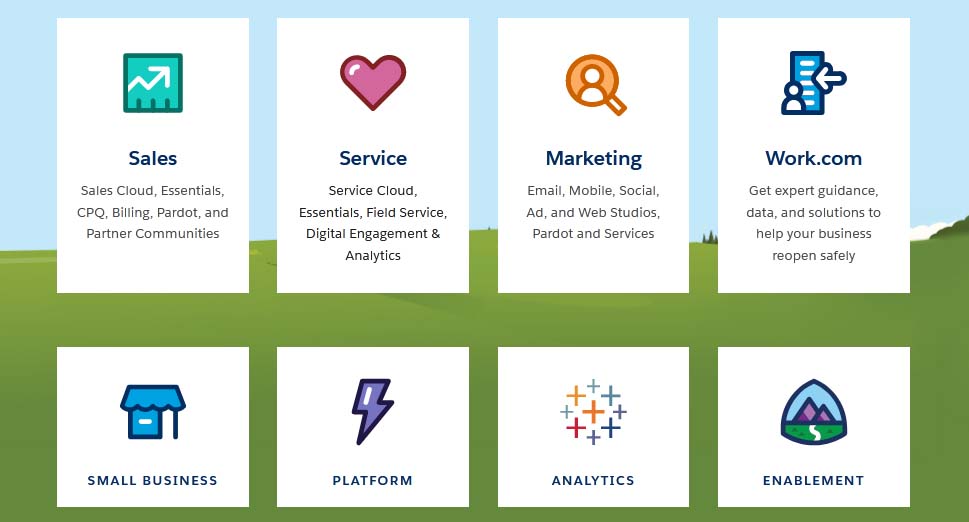
Salesforce pricing can be confusing at times.
monday.com vs. Salesforce CRM Pricing Key Takeaways:
- monday.com is hands down more affordable and simple.
- Salesforce pricing is complex and can be confusing for some.
- Both scale to enterprise features on a by-quote basis.
Ease of Use, Getting Started
monday.com is a lot easier to use than Salesforce CRM, hands down. With monday.com, it is easy to visualize tasks by different ways with one click, such as Gantt, Kanban, and timeline and calendar views. You can also switch views fast from the big picture to the task details, allowing you to grasp key data at a glance.
Likewise, a built-in time tracker makes it simple and accurate to gauge how long a task takes and, eventually, the entire project.
Meantime, a custom CRM template makes it fast to deploy a sales pipeline. You also get access to dozens of other templates for different but CRM-relevant use cases, such as campaign, customer onboarding, help desk, and event planning. You just pick the templates and connect them to each other and, presto! you have a core CRM infrastructure in minutes.
A typical plug-and-play SaaS, monday.com has a robust knowledge base of video tutorials, FAQs, and blog posts to help your team get up to speed with all its functionalities in an hour or so.
And with just a few clicks, you can also integrate it with just about any popular business app, including Slack, Google Apps, Zoom, Microsoft apps and Todoist.
On the other hand, ease of use for Salesforce is relative to the type of user. Large enterprise with complex CRM processes will surely find Salesforce CRM intuitive and simple to use compared with, say, a legacy system. There is a straightforward navigation simplicity among Salesforce apps, which helps you access key customer data from anywhere in the UI.
But smaller companies that do not expect to grow into an enterprise anytime soon will find Salesforce CRM complex and overwhelming with all its bells and whistles.
Never mind that you may be paying for advanced features that you won’t get to optimize for want of a huge customer base. In fact, you can quickly get lost among the Salesforce plans, all of which point back to having a robust CRM system.
Source: ibm.com
monday.com vs. Salesforce CRM Ease of Use Key Takeaways:
- monday.com is easier to set up and use. Non-techies can understand all its features in under an hour, thanks to its rich knowledge base.
- Salesforce CRM requires a technical know-how to configure its backend when setting it up.
Use Cases
Salesforce is 100% designed for CRM, which is sales and marketing. It doesn’t fancy itself outside of this core purpose. As a specialist, it has depth of features built on a core CRM process. It helps you sell, track leads, schedule appointments, run analytics, create campaigns, quote prices and verify customer information in one Salesforce architecture.
You can use it to provide customer service, build apps, run analytics for strategy planning, but these are all in support of your CRM plan.
Whereas monday.com is a generalist and is even comparable to task management software. It spreads itself across a variety of use cases outside of CRM, which include project management, HR, ITSM, creative and design and operations.
monday.com vs. Salesforce CRM Use Cases Key Takeaways:
- monday.com adapts to a wide range of use cases on top of CRM. These include project management, HR, operations, creative and design, and software development.
- Salesforce CRM is 100% used for CRM processes. Its features allow it to be used for business of any type and size.
monday.com vs. Salesforce CRM Comparison Table
| monday.com | Salesforce CRM | |
| Ideal for |
|
|
| Use cases |
|
|
| Core Features | ||
| Contact Management | ✓ | ✓ |
| Lead Management | ✓ | ✓ |
| Sales Pipeline | ✓ | ✓ |
| Lead Scoring | ✓ | ✓ |
| Analytics, Advanced Reporting | ✓ | ✓ |
| Quotes and Invoicing | ✓ | ✓ |
|
Key Integrations |
||
| Google Apps | ✓ | ✓ |
| Microsoft Teams | ✓ | ✓ |
| Dropbox | ✓ | ✓ |
| Slack | ✓ | ✓ |
| Zoom | ✓ | ✓ |
| Gmail | ✓ | ✓ |
| ✓ | ✓ | |
| Zapier | ✓ | ✓ |
| Adobe Creative Cloud | ✓ | ✓ |
| MailChimp | ✓ | ✓ |
| Pricing | ||
| Starts from | $8 per user/month | $25 per user/month |
| No. of plans | 5 | 4 |
Standard CRM or Complex CRM?
When comparing monday vs salesforce, it all boils down to having the need for a standard CRM or complex CRM. monday.com is best suited to running a typical CRM process. Like other easy-to-use CRM apps, monday.com has the key features that allow you to consolidate customer data for context and opportunities. It’s easy to set up, allowing you to move deals with clarity and focus. It also helps you manage team tasks and pinpoint bottlenecks to close more deals. And at reasonable pricing, a small business can easily establish a modern CRM pipeline in no time.
But as your CRM requirements grow, you’ll probably want to use Salesforce CRM. You have all the room to expand the functions, including utilizing an AI-powered lead scoring should you have hundreds of leads that are overwhelming your sales team. You can also turn to Einstein for insights on historical customer data. And with over 3,000 apps to integrate, Salesforce CRM can scale to enterprise level with ease. Of course, all these functions come at a cost that might not fit into a small wallet.
Key Insights
- Varied Focus and Flexibility: monday.com is a versatile work OS that can handle CRM processes, project management, HR, and software development. It is designed for small to medium-sized businesses, offering an easy setup and user-friendly interface. Salesforce CRM, on the other hand, is a robust, scalable solution ideal for larger enterprises with complex CRM needs. It offers deep integration with other Salesforce products and a wide range of advanced CRM features.
- Core CRM Features: Both platforms provide essential CRM functions such as contact management, lead management, sales pipeline, lead scoring, analytics, and quotes and invoicing. Salesforce, however, offers more advanced features and greater customization options.
- Integration Capabilities: Salesforce excels in integration, leveraging its extensive AppExchange with over 3,000 verified apps. monday.com also integrates with popular business and productivity apps but relies more on third-party connectors like Zapier for additional functionalities.
- Ease of Use: monday.com is known for its simplicity and ease of use, making it accessible to non-technical users. Salesforce, while powerful, may require technical expertise for initial setup and configuration, making it less intuitive for smaller businesses without IT support.
- Pricing: monday.com is more affordable with a straightforward pricing structure starting at $8 per user/month. Salesforce offers more comprehensive CRM capabilities but at a higher cost, starting at $25 per user/month and scaling up to $300 per user/month for advanced features.
- Use Cases: monday.com is a generalist platform that can be used for various business processes beyond CRM. Salesforce is a specialist in CRM, providing a comprehensive solution tailored to sales, marketing, and customer service needs.
FAQ
1. What are the main differences between monday.com and Salesforce CRM?
monday.com is a flexible work OS that can handle multiple business processes, including CRM, project management, HR, and software development. It is designed for ease of use and affordability, making it ideal for small to medium-sized businesses. Salesforce CRM, however, is a robust, scalable CRM solution designed for larger enterprises with complex CRM needs. It offers advanced features, extensive integration capabilities, and deep customization options.
2. Which platform is easier to use?
monday.com is generally easier to use due to its user-friendly interface and straightforward setup process. It is designed for non-technical users, making it accessible to small businesses without IT support. Salesforce CRM, while powerful and feature-rich, may require technical expertise for initial setup and configuration, making it more suitable for larger organizations with dedicated IT teams.
3. How do the pricing structures of monday.com and Salesforce CRM compare?
monday.com offers a more affordable and simplified pricing structure, starting at $8 per user/month. It also provides a free plan for up to two users. Salesforce CRM, on the other hand, has a higher cost, starting at $25 per user/month and scaling up to $300 per user/month for advanced features. Salesforce’s pricing can be complex and may include additional costs for integrating other Salesforce products.
4. What are the key integration capabilities of each platform?
Salesforce CRM has an extensive integration ecosystem through its AppExchange, offering over 3,000 verified apps that can extend its core CRM functions. monday.com also integrates with popular business and productivity apps like Google Apps, Microsoft Teams, Slack, and Zoom, but it relies more on third-party connectors like Zapier for additional functionalities.
5. Which platform is better for small businesses?
monday.com is generally better suited for small businesses due to its affordability, ease of use, and versatility in handling various business processes. Its simple setup and user-friendly interface make it accessible to small teams without technical expertise. Salesforce CRM, while offering more advanced features, may be overkill for small businesses with basic CRM needs.
6. What advanced features does Salesforce CRM offer that monday.com does not?
Salesforce CRM offers advanced features such as AI-powered lead scoring with Salesforce Einstein, collaborative forecasting, workflow and approval automation, and real-time data analytics. These features provide deeper insights and more sophisticated CRM capabilities, making Salesforce suitable for large enterprises with complex CRM requirements.
7. Can monday.com handle complex CRM processes?
While monday.com can handle standard CRM processes effectively, it may not be as well-suited for complex CRM needs as Salesforce. monday.com is best for businesses with straightforward CRM requirements and those that need an all-in-one platform for various business processes. For more complex CRM needs, Salesforce offers a more comprehensive solution with advanced features and extensive customization options.
8. How do both platforms support sales pipeline management?
Both monday.com and Salesforce CRM offer tools for sales pipeline management. monday.com provides a customizable lead board and automation features through integrations. Salesforce CRM offers a rich sales path feature, visualizing the sales process and providing tools for lead scoring, contextual data, and advanced pipeline management.
9. Which platform is better for marketing automation?
Salesforce CRM is generally better for marketing automation due to its integration with Salesforce Pardot, providing advanced marketing automation tools, lead nurturing, and campaign management. monday.com offers basic marketing automation features but may require additional integrations for more comprehensive capabilities.
























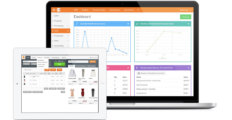


Leave a comment!